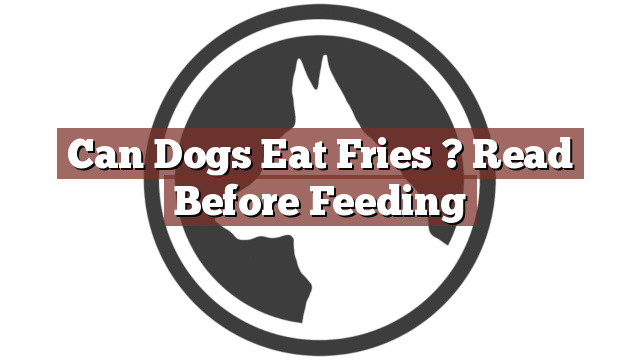Understanding Your Dog’s Dietary Needs
As a responsible pet owner, it is crucial to understand your dog’s dietary needs. Dogs are omnivores, which means they can eat both meat and plant-based foods. However, their nutritional requirements differ from ours. While some human foods can be safely shared with our canine companions, others may be harmful or even toxic to them. It is important to be aware of what foods are safe for dogs to consume and what should be avoided.
Can Dogs Eat Fries? Read Before Feeding
Can dogs eat fries? This is a question that many dog owners may have. The answer is no. French fries, although a popular and delicious snack for humans, should not be fed to dogs. While a small amount of plain, cooked potatoes may be safe for dogs to eat, the way fries are prepared makes them unsuitable for our furry friends.
Fries are usually deep-fried in oil and seasoned with salt and other spices. The excess oil and salt can be harmful to dogs and may lead to digestive issues such as pancreatitis or upset stomach. Additionally, the high fat content in fries can contribute to weight gain and obesity in dogs. Therefore, it is best to avoid feeding fries to your dog to ensure their overall health and well-being.
Pros and Cons of Feeding Fries to Your Dog
Feeding fries to your dog may seem like a harmless indulgence, but it comes with several potential risks and drawbacks. Here are some pros and cons to consider:
Pros of feeding fries:
- Dogs may enjoy the taste of fries due to their high salt and fat content.
- Fries are a quick and convenient snack that can be shared with your dog.
Cons of feeding fries:
- Excess salt in fries can lead to dehydration and sodium imbalances in dogs.
- The high fat content in fries can contribute to obesity and related health issues in dogs.
- Fried foods can be difficult for dogs to digest and may cause gastrointestinal upset.
- Seasonings and additives in fries, such as garlic or onion powder, can be toxic to dogs.
Ultimately, the cons outweigh the pros when it comes to feeding fries to your dog. It is always better to prioritize their health and choose alternative, dog-friendly treats.
In Conclusion: Think Twice Before Sharing Fries with Your Furry Friend
While sharing food with our beloved pets can be a joyous experience, it is important to be cautious about what we feed them. When it comes to fries, the answer to "Can dogs eat fries?" is a clear no. The high fat, salt, and seasoning content in fries can be detrimental to a dog’s health and lead to various complications. It is best to opt for healthier, dog-specific treats that are formulated to meet their nutritional needs. Consult with your veterinarian for a list of safe and suitable snacks that you can share with your furry friend. Remember, their well-being should always be our top priority.
Thank you for taking the time to read through our exploration of [page_title]. As every dog lover knows, our furry friends have unique dietary needs and responses, often varying from one canine to another. This is why it's paramount to approach any changes in their diet with caution and knowledge.
Before introducing any new treats or making alterations to your dog's diet based on our insights, it's crucial to consult with a veterinarian about [page_title]. Their expertise ensures that the choices you make are well-suited to your particular pet's health and well-being.
Even seemingly harmless foods can sometimes lead to allergic reactions or digestive issues, which is why monitoring your dog after introducing any new food item is essential.
The content provided here on [page_title] is crafted with care, thorough research, and a genuine love for dogs. Nevertheless, it serves as a general guideline and should not be considered a substitute for professional veterinary advice.
Always prioritize the expert insights of your veterinarian, and remember that the health and happiness of your furry companion come first.
May your journey with your pet continue to be filled with joy, love, and safe culinary adventures. Happy reading, and even happier snacking for your canine friend!

